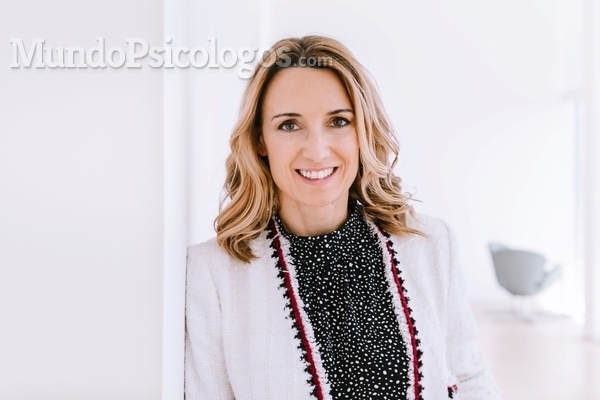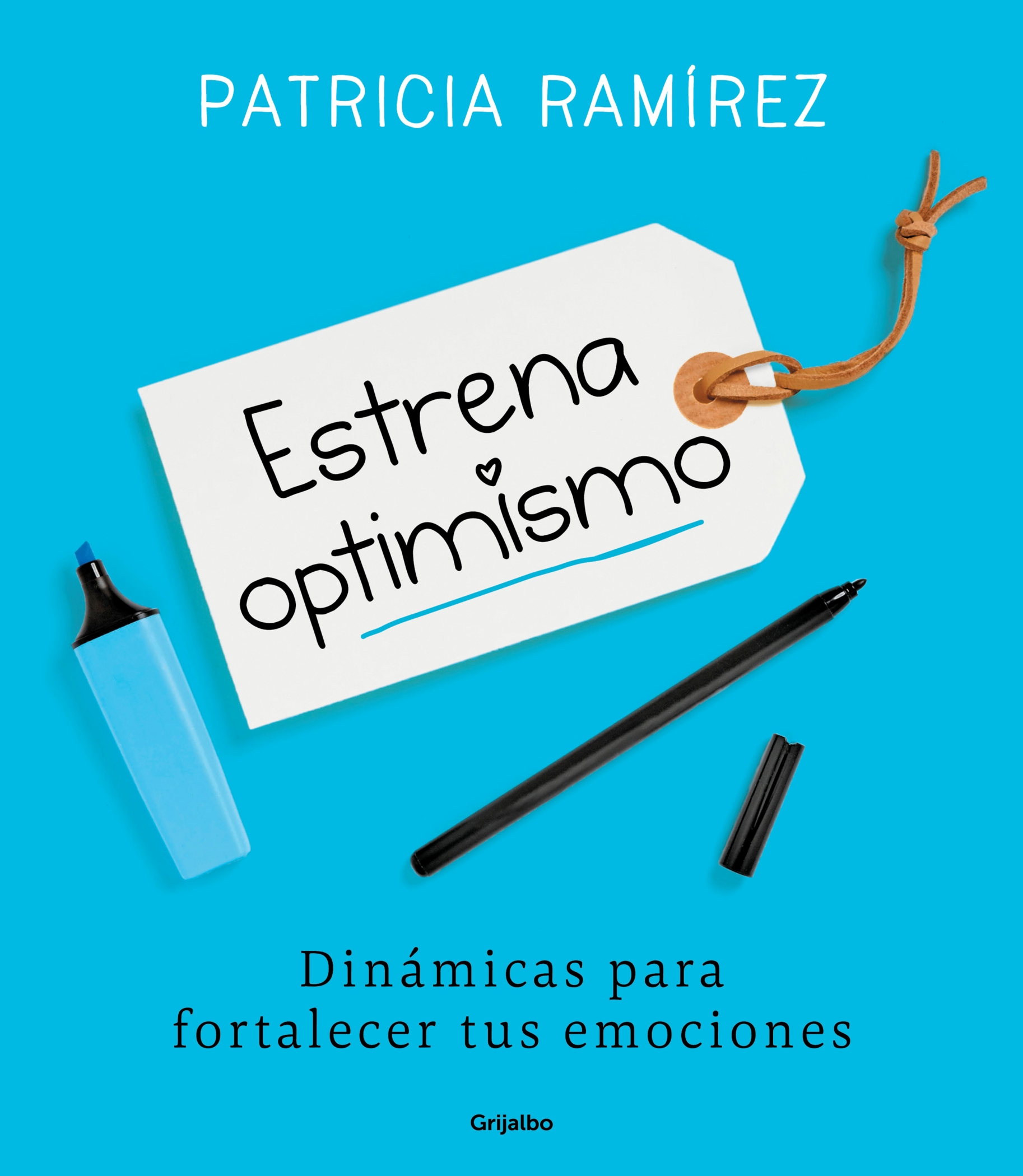Do you get stressed when you have to speak in public? Does thinking about moving upset you? Well know that it happens to almost all of us.

This is due to an evolutionary bias that our ancestors have left us. The positive part: you have time to train your mind to tame those fears and live better.
This is what the psychologist says Patricia Ramirez, one of the most media faces of psychology in our country, collaborator of the television program Para todos La 2 and publications such as El País or 20minutos. Ramírez, one of the “most influential psychologists in Spain”an adjective for the publisher that it does not take itself too seriously, has just published its seventh book, “Show optimismeither” (Grijalbo, 2018) and is about to take the stage at the Nuevo Apolo theater, in Madrid, to present the play “10 ways to destroy your relationship” together with the psychologist Silvia Congost. Her innovative work with Spanish La Liga soccer teams put her in the media spotlight; her talent did the rest.
– Books, press, television, social networks and now theater. The editorial presents her as the “most influential psychologist in Spain.” How does she handle this fame?
– It has been exaggerated! It all started when I received, in 2017, an award from the College of Psychologists for “the most influential psychologist on social networks.” Since then, some media have used the term “most influential” without saying that it was an award that the School had given me. But with the number of psychologists in Spain, it is more than likely that someone has more followers than me. I think all this is because I try to convey rigorous information in a simple way and, in addition, I try to make it very visual. The fact of being a popularizer, and appearing in the media, has earned me that qualification. But there are no influential psychologists!
– But it is beyond dispute that his name is one of those that people have in mind when they think of psychologists. His collaborations with the media will be partly to blame.
– Media, that is. Although not because of my effort, I am a media person because football made me a media person. Then TV expanded it, think that I have been on television for seven years now, on the program Para Todos La 2.
– And now he is going to make the leap to the theater. “10 ways to ruin your relationship” will premiere on March 25 at the Nuevo Apolo theater in Madrid, along with fellow psychologist Silvia Congost.
– Yes, we’re opening right now. We are going to do a monologue, although we should call it a bidologist, since we do it between the two of us. The play is called that because we are going to present, with a touch of humor, all those mistakes that we make as a couple. And also from humor we want viewers to learn to correct them. Although people don’t believe it, the easy thing is to get along as a couple, the difficult thing is the other; It seems that people make a lot of effort to destroy their relationship.
– In your new book “Premiere Optimism” you comment on something similar. You have to make an effort to destroy a relationship, just as we all have a tendency not to be factory optimists, it takes commitment and effort.
– Studies tell us that the brain is configured to detect threats, and really, thanks to that radar that we have, we have managed to survive and be here speaking today. But threats have evolved differently than our limbic system has evolved. Emotionally, we continue to react the same to threats even though we are no longer exposed to dangers that threaten our lives. Before, hunting and eating was a danger; Taking shelter was a danger and being healthy was not easy either. Currently we have antibiotics in pharmacies, we can go to the supermarket, we have heating in our homes, but we still have that alert system that reacts to activities that should not cause us danger: speaking in public, interacting with people, fear of losing a partner, drive, move house or get married. People have turned a lot of situations into stressors that shouldn’t be so serious as to stimulate our sympathetic nervous system. They are activities to which a solution must be given, which will surely have to be analyzed in detail, which will have to be interpreted. But they certainly shouldn’t scare us.
– So, everything has an evolutionary origin?
– Sure, we are responding the same as when we lived in the caves, but this is no longer the case. It’s easier to be negative, we have a natural tendency to do so. But if we educate and train the brain to see that part in a more positive way, we can live with more serenity.
– Should optimism be an obligation?
– It should be a choice, just as it should be a choice to exercise, sleep the hours we need or eat healthy. But depending on the habit that each one has, starting to think positively is going to require an effort that one does not want to make. That person who is a victim, who loves to ruminate, who even feels safe thinking about things that they cannot control (which is nothing more than a way to relieve their anxiety although it later becomes more potent), well, those people sometimes do not they want to change. Should they be positive? If we use “should” just as we say “we should have human values”, “we should be better people”, “we should be able to live happily”, well I say yes. But we should never see it as an obligation. And, above all, people have to know that they can choose to be positive, many people are unaware that they have that possibility.
– Is there a relationship between mental health, physical health and optimism?
– I have no doubt. It is already known that emotions such as anxiety release the hormone cortisol and adrenaline. Sadness is also associated with a deficit or loss of neurotransmitters; Both cortisol and neurotransmitters condition our mood. Cortisol can condition our immune system, immunosuppressing it. Happy people tend to have better health, and not just physically. When you are optimistic, you relate to people on a more trusting level, you surround yourself with social support, you trust them, you have a state of mind that allows you to do things that feel good to you; Somehow you engage in healthy lifestyle habits that improve you. So there is a direct relationship, of course,
– So, the results of a medical analysis of an optimistic person can be different from those of a person who, with the same physical condition, is not optimistic?
– Of course, neurotransmitters such as dopamine, serotonin or endorphins work in a more balanced way if, for example, you do not suffer from anxiety or stress, so your immune system is more protected.

– What is the relationship between optimism and resilience, one of the words of 2018.
– Resilience is the ability to recover from adversity. The optimist is that person who, instead of staying stuck in the past and what has gone wrong, tends to turn the page, to see failure as something temporary, to look for solutions, to trust that with their strengths or their perseverance and with the support of others you will achieve things. In fact, being optimistic is one of the characteristics of resilient people, so the relationship is direct. The resilient person is always more optimistic, just as optimism is a quality of the resilient person. A pessimistic person, who believes that he thinks he will never have support, who believes that if he thinks he is going to get out, he is going to fall, because he cannot be resilient, since this is the one who recovers; He who is pessimistic is not recovering, he is ruminating about the same situation.
– Now that we are still in January, and we all have our good resolutions, what would you recommend to those of us who want to be more optimistic in 2019, what should we take care of first?
– The pessimist has to learn to interpret the environment differently and change the focus of attention. Not everything we interpret about the environment is absolute, everything has a positive interpretation, there will always be something good that we can keep. If we focus on everything that can fail, we will eventually find it, because the mind finds what we are looking for. At the moment when one tries to accept that there are things that one cannot control, that there are things that we do not like but they are there, that there is a part of life that is unfair, but you focus your attention on things that they do catch you or that they do add up, because we are already seeing life in a different way. For me, the optimist has to be focused on what adds up, on accepting things that we cannot change, on taking care of what he does not like, but that he can control, that would be the fundamental thing.
– The General Council of Official Colleges of Psychologists (COP) has given its opinion on the practice of pseudotherapies and seems to have divided the profession; many psychologists believe that it should have been more restrictive with these practices.
– Well, honestly, I agree, I am against pseudotherapies. I believe that people who seek therapy, and who seek help, are at a very vulnerable time in their lives. For me it is very important, it is a complicated moment in your life and one tends to listen to whatever it is, people leave until they are dealt the cards. If there is something important at that moment, it is that you are accompanied by a trained person, who has a scientific basis to be able to care for you, that the treatment they do with you has been tested and, above all, that it works. But of course, if you opt for pseudotherapy with someone with a lot of “charisma”, it will turn out that they can do you a lot of harm in the long run. We are playing with people’s health. Just as medicine is very clear about what medicine is, psychology has to be very clear about what psychology is.
– Is psychology a particularly fertile ground for the emergence of these theories without a scientific basis?
– I see that psychology, nutrition and physical activity are three disciplines in which there is a lot of intrusion. I think we should regulate it and be very careful.
– Do you think it is a problem right now in your profession?
– Completely. Starting with all the brainless people on social media, conveying that everything is attitude, that in this life there is no ceiling or limit, that message that “you set the limit” seems outrageous to me. Imagine the level of frustration for people who are depressed, who really have a deficit in their serotonin, and feel guilty when they say to themselves: “Oh, I don’t have enough attitude to improve myself in life and everything depends on me.” It seems animalistic to me. So I think that should be regulated, it can do a lot of damage.
– You handle all social networks very well. Do you have a favorite one, one that you only use for your personal life?
– Instagram, I love it. I do not have a personal network and a professional network, I do not have it differentiated. On my professional Instagram I post photos of my dog, or some comments with my children, so it doesn’t make a difference. And the social network that I like the least is Facebook. In fact, I forgot the passwords to access it and I have done nothing to recover them, everything that appears on my Facebook is published when it is synchronized with my other networks. I never go on Facebook or reply there, although it is also true that I don’t have time for everything.
– Offers online consultation via Skype.
– Yes, I started years ago. When I started appearing on television, seven years ago, the program was also broadcast on the TVE International Channel and Spaniards who watched it from Switzerland, in Miami, began to call me. They watched the program, they consulted me, and I started working through Skype with them. Furthermore, with all the elite athletes that I take, who are in the United States when they are not competing in Shanghai, it is necessary for me to work the sessions over Skype. And I can say that they work the same, you have to worry about the data protection and security part, yes.
– Do you think that therapy will continue to advance through this new online channel or that it will remain anecdotal?
– Of course online therapy will continue to grow. I love face-to-face therapy, I am a very affectionate person, I like to see the patient arrive, give them two kisses, smile, have them close, I love that whole part. But really, the Skype consultation has nothing to envy of the other, because since you have the person on the screen, you make even more effort to connect non-verbally with the person, you make an effort to be attentive. Sometimes I stick my finger on the screen to point at them and tell them, “Oh, I’m going to grab you by the throat!” You try to be in more humor and seek more connection so that the difference is not noticeable compared to in-person therapy.
– You are a psychologist with a long and prestigious professional career. Do you have any advice for someone who is considering studying Psychology, who is discussing with their parents, for example, whether it is the right career path?
– If it were up to my mother I wouldn’t be a psychologist, she warned me that I was going to die of hunger, and that was twenty-something years ago, almost thirty. In this life you have to be guided by what your passions are. My mother wanted me to study Law, and then I would have died, I don’t know if it was from hunger, but certainly from sadness. I knew from the age of 15 that I wanted to be a psychologist, and I have a head as hard as a plow for that. He who is really clear that this is his vocation… I understand that one does not want to have an argument with his father, but you are choosing the future of your life and you have to be guided by what you are passionate about. Psychology has more and more outlets, there are more and more people who trust in psychology. I no longer have major disorders, I started with them (psychotic disorders, depression, etc.) when I finished the master’s degree in Clinical Psychology in Granada and now I no longer have any of that. Now I am making simple behavioral changes: learning to eat serenely, exercising, things that motivate and that are already very common among people. So the psychologist will really be there for everyone: he is not limited to the percentage of people who have a psychosis problem, he is open to anyone who has a question as a couple or who wants to better educate their children. Many people no longer go to a psychologist to get over it, as before, but rather to help things go better or to be more optimistic.








